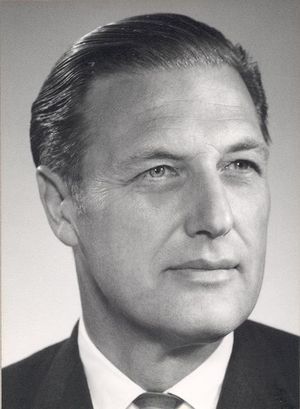Bernard Oliver
- Birthdate
- 1916/05/17
- Birthplace
- Soquel, CA, USA
- Death date
- 1995/11/23
- Associated organizations
- Bell Labs, Hewlett-Packard
1965
Bernard M. Oliver, IEEE President, 1965, served as the director of research for Hewlett-Packard, where he supervised the production of the first hand-held calculators at Hewlett-Packard in the early 1970s. His professional interests were in Information Theory and Coding Systems.
Biography
Dr. Bernard Oliver (IRE Student, 1940; Associate, 1940; Member, 1946; Senior Member, 1953; and Fellow, 1954) was born in Soquel, California and grew up on a farm there. His father was a civil engineer and his mother was a teacher; both held degrees from UC Berkeley. Oliver's mother took him with her to school while she taught. This was one reason, among others, that he skipped several grades before entering high school. After some study at California Institute of Technology, an interest in working with Frederick Terman drew Oliver to Stanford, where he graduated at the age of 19. He then returned to California Institute of Technology for his M.S. degree, received in 1936. Following a year of study in Germany under an exchange scholarship, Oliver returned to the California Institute of Technology, where he received the Ph.D. degree, in 1940.
He began his career at Bell Telephone Laboratories in New York. He initially worked on television, but later turned his attention to radar development as America became involved in World War II. He also did work with Claude Shannon on pulse-code modulation. Barney enjoyed his twelve years of work at Bell Labs, so much so that he initially declined an offer from fellow Stanford alumni William Hewlett and David Packard to join their growing electronics company in Palo Alto. However in 1952, Oliver returned to northern California and joined Hewlett-Packard as the Director of Research. In 1957, he was named Vice President for R&D, and joined HP's Board of Directors. Under his leadership the first hand-held calculators were produced at Hewlett-Packard in the early 1970's. He retired from full-time work at HP after 28 years there, but continued to serve as a consultant.
Oliver also had important side interests. He founded Biosys, a company specializing in agriculture. Oliver also became well known for his strong interest in the search for extra-terrestrial intelligence (SETI). In 1971, NASA funded a SETI study that involved Oliver and John Billingham. The resulting report proposed the construction of an Earth-based radio telescope array with 1,500 dishes known as "Project Cyclops". While the telescope was not built, the report's importance is widely recognized.
Dr. Oliver also enjoyed art, music and literature. He served with distinction on the Palo Alto School Board for twelve years and acted as an advisor for the Bay Area Rapid Transit (BART) System. He also quietly made significant financial contributions to educational and scientific institutions, such as UC Santa Cruz, San Francisco’s Exploratorium, the Monterey Bay Aquarium and the Allegheny Observatory at the University of Pittsburgh. Mr. Oliver was married to Priscilla Newton from 1945 until her death in December 1994. Together they raised three children, Karen Newton Oliver, Gretchen More Oliver and William Eric Oliver.
Dr. Oliver held over sixty patents and authored many technical papers. He received many honors, including the 1986 National Medal of Science. He served as president of the IEEE in 1965 and was a member of the American Astronautical Society. Dr. Oliver died on November 23, 1995.
